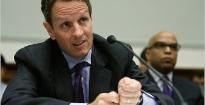Geithner Predicts: Debt Ceiling Will Be Raised
Treasury Secretary Timothy Geithner on Wednesday termed Republican opposition to President Obama’s plan to invest in infrastructure and other areas “sort of too dark a vision of our future.”
GOP lawmakers have criticized White House proposals on investment, noting the country’s budget problems in the process. But Geithner retorted that the problems Washington faces are manageable, especially if there is a continuation of the sort of bipartisan cooperation that helped push through the tax-cut compromise last year.
“The test should be not the simple question of who can be more austere, who can go deeper,” Geithner said during an interview at a town hall on the economy hosted by The Atlantic. “The question should go .. on spending, the question should be who is going to be smarter, more pragmatic, in a deficit reduction plan that, again, preserves incentives for innovation and we can be more confident is going to help us grow more rapidly in the future.”
The secretary’s comments came on the same day that a post he authored on infrastructure appeared on Treasury’s blog, where he argued that investments lead to strong>long-term growth<, while acknowledging that not all infrastructure projects deserved funding. They also came just a day after the administration announced it strong>planned< to spend $53 billion over six years to upgrade high-speed rail.
During his wide-ranging interview at the town hall with Judy Woodruff of PBS, Geithner also talked about investments in education and research and development, while also touching on the strength of the American economy, the debate over the debt ceiling, tax reform and government spending. And in the process, the Treasury secretary appeared at times to chide Republicans for their approach on some of those issues, while also underscoring how differently the two parties view government’s involvement in the economy.
For instance, Geithner said that the president’s upcoming budget would include a plan to reduce deficits over time, while insinuating that a recent GOP plan to slash non-security related discretionary spending this year did not.
“When you hear people say we want to cut spending, you want to ask them: Where will they cut? But you also want to ask them: What will they do to the broader deficit?” Geithner asked, adding: “Because you're not going to solve that broader debt problem by just focusing on cutting deeply into discretionary spending.”
Sen. Kent Conrad (D-N.D.), the Budget Committee chairman, has also called for a more long-term approach to deficit issues.
Perhaps not surprisingly, House Republicans have had different takes when it comes to investments and the budget, saying their plan to cut discretionary spending brings sanity back to the budgeting process.
Rep. Eric Cantor (R-Va.), the majority leader, also said on Wednesday that House Republicans had “talked about our plan to cut spending because that has provided a big inhibitor to investment and job growth.” And Rep. Paul Ryan (R-Wisc.), the chairman of the House Budget Committee, has noted that “strong>only in Washington<” does more government spending amount to investment.
At the town hall, Geithner, who has said that it would be catastrophic if Congress failed to raise the debt ceiling, also noted that he expected the limit to be raised, adding that “there's always a little political theater around this.”
Click here to read more.


